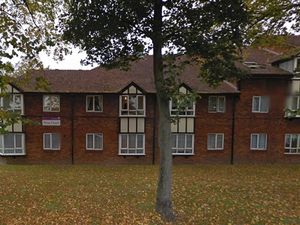Walsall Manor Hospital's 'understaffed' maternity services told to improve
Walsall Healthcare NHS Trust has been told it must make improvements to its maternity services after inspectors found low staffing levels were leading to a "deterioration in the quality of care".

An unannounced, focused inspection of Walsall Manor Hospital was carried out in July by the Care Quality Commission (CQC) in response to concerns around safety and governance.
Inspectors looked at how well-led, safe and effective the service was, resulting in an overall rating of 'requires improvement'.
The service ratings for the categories of safe and well-led remain at 'requires improvement', while the rating of effective went down from 'good' to 'requires improvement'.
The trust has pledged to do "do better by" their patients following the inspection report.
The inspection highlighted that service leads were knowledgeable of the risks, performance and development needs, and there was a cohesive plan to address concerns. But inspectors said some were not aware of the strength of feeling from staff, with some reporting their leaders were unsupportive, overly critical and unapproachable.
Some midwives reported that concerns were not always escalated due to ineffective relationships with leaders. Others reported that no support was offered when they raised concerns.
Fiona Allinson, the CQC's deputy chief inspector of hospitals, said: "When inspectors visited the maternity service at Walsall Healthcare NHS Trust, it was clear that staff supported one another to deliver patient focused care, but it was also evident that understaffing was causing a deterioration in the quality of that care.
“Some staff and midwives were visibly upset and frustrated when talking about their experiences, with each area we visited identifying low staffing as the main risk. The number of vacancies had been exacerbated by staff having to self-isolate due to Covid-19.
“Managers did not always accurately calculate and ensure there were sufficient numbers and grades of midwives, nursing assistants and care support workers needed for each shift in accordance with national guidance.
“This meant specialist midwives were often moved from their roles to cover vacant shifts elsewhere which left gaps in specialist services. We saw two incidents where infant-feeding midwives were unable to provide support to mothers and babies as they were working elsewhere.
“Inspectors reported their findings to the trust leadership and will continue to monitor the service to ensure the necessary improvements are made.”
Professor David Loughton CBE, interim chief executive at Walsall Healthcare NHS Trust, said: “Midwifery staffing was a pressure being felt across the country and Walsall was no exception.
“Our main priority is the safety and wellbeing of our patients who deserve the best care and support and need to be confident about giving birth at Walsall Manor Hospital. Our pledge today is to do better by them.
“We know we need to ensure there are adequate numbers of staff to meet the demands of the service and keep service users safe from avoidable harm – as highlighted in the inspection report published today. The Trust is doing all it can to recruit midwives into what we are working hard to ensure is a supportive and inclusive environment for them. This includes working with local universities to recruit newly qualified midwives and international recruitment, to support our ongoing recruitment campaigns.
“It’s also important that we look after our existing staff. In the summer we introduced the Clinical Fellowship Programme developed in partnership with the University of Wolverhampton to provide an opportunity for midwives to study up to and including masters level, fully funded by the trust.
“The Covid-19 pandemic has undoubtedly had a huge impact on colleagues in maternity services. They have had an extremely tough time where they have had to support mums-to-be in completely different ways and I know many have found this difficult. I am personally really disappointed that staff have said they don’t always feel supported and valued; we have to change this for them.”
The trust has been told it must make improvements including having adequate numbers of staff to meet the demands of the service; that all risk assessments and women records must be completed accurately and reflect risks based on full assessments; and all medicines must be stored safely and securely.
Other improvements including staff maintaining effective infection control and prevention practices; as well as governance arrangements must be robust to ensure risks and poor performances are identified and any risks are mitigated.





